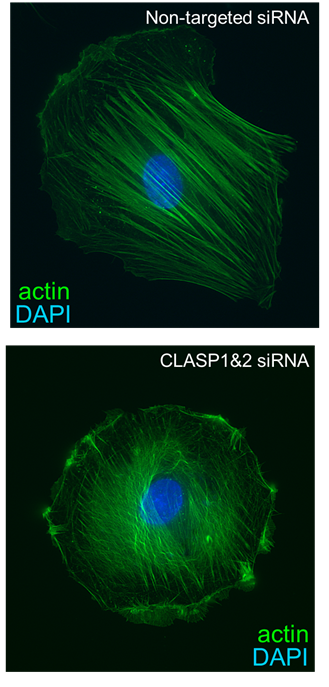Microtubule dependent regulation of Actin cytoskeleton
Investigator: Currently open

Study of the inter-relationship between microtubule-actin networks provides a fuller understanding of cellular physiology. Actin stress fibres (SFs) form contractile networks that generate forces essential for processes such as migration, morphogenesis and remodeling of the extracellular matrix.
The regulatory mechanisms defining complex organization and dynamics of stress fibers are an ongoing field of study. Initial experiments show that stress fibers are altered in cells lacking microtubule-associated proteins CLASPs. The picture shows actin fibers in green, stained with phalloidin, and nucleus in blue with DAPI. Control cell is shown above and the CLASP depleted cell is shown below. Image credit: Dr. Nadia Efimova
In CLASP-depleted cells, actin bundles are disorganized, with ventral stress fibers being severely affected. CLASP depleted cells also have loss of actin bundling, leading to a model where CLASPs regulate actin bundling to form stress fibers. This project is a collaboration with Marija Zanic laboratory (see Rodgers et al. 2023) in our department and includes both in vitro and cellular studies targeted to unravel the mechanistic details of this process. We are also interested in the functional consequences of stress fiber distortion of cell mechanics and motility.
Relevant publications:
Podosome-regulating kinesin KIF1C translocates to the cell periphery in a CLASP-dependent manner.